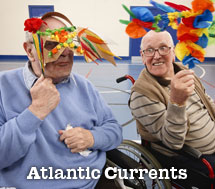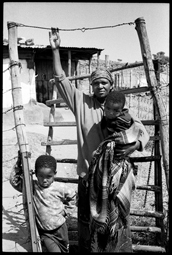Changing the Story: Using the Arts to Advance Social Justice
Resource type: News
Gara LaMarche |
 In the 2008 film Sin Nombre, the audience follows a young Honduran woman named Sayra as she winds her way through Mexico and into the United States in search of a better life. Her trip is lonely and dangerous, and through her eyes Sin Nombre – or “without name” – humanises the issues of immigration in a way that no policy paper can.
In the 2008 film Sin Nombre, the audience follows a young Honduran woman named Sayra as she winds her way through Mexico and into the United States in search of a better life. Her trip is lonely and dangerous, and through her eyes Sin Nombre – or “without name” – humanises the issues of immigration in a way that no policy paper can.
I was thinking about Sin Nombre as the intensity of anti-immigrant rhetoric has escalated in the United States in recent weeks, along with the strong response to it from the advocates Atlantic helps to support. While there are many effective tools to achieve social justice – litigation, organising and policy advocacy – often it is an image or a story that draws you in. Change can happen in the streets, in Congress or at a community meeting, but it can also be sparked in a theatre or through a photograph.
At The Atlantic Philanthropies, we invest in campaigns, institutions, movements and individuals that give voice to the people most affected by injustice. We believe that social change is best brought about by the people who need it the most and that lasting progress comes from building their strength to advocate on their own behalf. The arts can be a powerful path toward these goals, elevating and amplifying the voices of those most affected by injustice.
Through film, theatre, photography, books and other media, we can paint vivid pictures of the conditions in which people live and work, and of their struggle to find solutions. The arts have a unique capacity to raise awareness, build bigger constituencies for social justice and meet people where they are. The arts are also participatory, engaging affected communities directly in advocating for themselves. Think of the gospel music spirituals that were the soundtrack for the civil rights movement, or of the Jacob Riis photographs that exposed persistent poverty in New York City at the turn of the last century.
There are examples of this impact throughout Atlantic’s work around the globe. In South Africa, our grantee, Out in Africa, has coordinated the annual Gay and Lesbian Film festival since 1994. Although lesbians, gays, bisexual and transgender (LGBT) people are promised equality under the South African Constitution, they still experience widespread prejudice. Suicide rates are high; discrimination is common; and violence is frequent – in particular the horrific ritual rape of lesbians. Homophobia in South Africa is a significant challenge – and a focus of Atlantic’s Reconciliation & Human Rights Programme.
In 2004, Out in Africa approached us with a proposal: they wanted to take the film festival on the road, into communities where discrimination was the worst. Our investment extended the reach of the festival throughout South Africa, for satellite screenings, dialogues and mini-festivals. Out in Africa also developed a “video suitcase,” a selection of videos and teaching tools left behind with local grassroots organisations, so they can then organise screenings and discussions on their own.
The 2008 study, Gay People Are Living There, documented the impact of the festival in Mafikeng, a city in South Africa’s remote, dusty North West province. Organising there took courage – organisers reported threats and harassment, at one point fleeing a group of students hurling stones and epithets.
Ultimately, the tension gave way to a joyful weekend of workshops, discussions and film. Features ranged from Possessed by Demons, a personal account of a South African congregation confronting “a lesbian in their midst,” to Anyone and Everyone, an American film about coming out. A closing barbeque drew hundreds. Afterwards, residents spoke of the changes in their lives. “I didn’t know there were so many gays and lesbians here,” one woman said, “I realised it is possible to be gay and have a normal life.”
The festival also provided an invaluable boost to Mafikeng’s only LGBT organisation, Gay Umbrella. The group now has a mailing list, expanded membership and the video suitcase. Suitcases are left after each festival, and also distributed throughout the region in countries like Zimbabwe, Uganda and Zambia, where homosexuality is still illegal. In that sense, Out in Africa is truly a human rights organisation that has applied art as a grassroots lens to its work, using film to engage new audiences on an issue critical to full equality in South Africa.
 Other Atlantic-supported initiatives in South Africa have used arts to advance social justice. In 2008 I wrote about the Farm Life project, a campaign to raise awareness about the living conditions of farm workers and the rural poor. The campaign integrated multiple tactics, including putting a face to the statistics by commissioning photographs and personal stories of farm life in the 21st century by noted photographer Jurgen Schadeberg, who then published a book, Voices from the Land, and shared them in a traveling exhibit.
Other Atlantic-supported initiatives in South Africa have used arts to advance social justice. In 2008 I wrote about the Farm Life project, a campaign to raise awareness about the living conditions of farm workers and the rural poor. The campaign integrated multiple tactics, including putting a face to the statistics by commissioning photographs and personal stories of farm life in the 21st century by noted photographer Jurgen Schadeberg, who then published a book, Voices from the Land, and shared them in a traveling exhibit.
In Northern Ireland, a different kind of “arts organising” is elevating the voices of older people. Older residents, as in many places, are seen as objects of services and consumers of benefits – people to whom things are done – rather than vital and individual citizens – subjects in their own lives. As the Government in Northern Ireland reduces the assistance provided by the state in the wake of the global financial crisis, many low-income older adults may suffer disproportionately. Add to this the barriers of poverty, ageism and isolation, and the need to empower older people as catalysts of change is both urgent and compelling.
Enter Big Telly, the longest established professional theatre company in Northern Ireland. Big Telly came to Atlantic with an idea for a theatre programme that would make older people’s power evident and visible – and that would provide opportunities for creative expression.
In residential homes, day-care centres, older people’s groups and homes in rural areas throughout Northern Ireland, Big Telly’s “Spring Chickens” initiative began as a series of two-hour workshops in role-playing, storytelling, characterisations and mime. The initiative culminated in five simultaneous, live performances by over 500 older people in venues across Northern Ireland. The performances, each of which was scripted and produced by older people, addressed issues of importance to the community. Unusually for an arts-based project, this production process included discussion of which messages presented on stage could most effectively influence policy. The best thing about “Spring Chickens?” It’s really engaging. It reminds us why we love our work and the grantees our Ageing Programme serves. Watch this short video and see.
These are just a few examples of how The Atlantic Philanthropies invests in organisations that use the arts to advance social justice. There are plenty more. In the Republic of Ireland, The Forum on Migration and Communication (FOMACS) has used documentary film, animation and photography to raise awareness about the challenges facing migrants and undocumented workers. In Viet Nam, Atlantic supported the development of a 26-episode serial drama for Vietnamese television to increase awareness of issues like HIV/AIDS and drug abuse. And in Bermuda, The Chewstick Foundation has met a twin crisis – lack of opportunities for youth and a loss of Bermudan identity – with innovative music, spoken word and poetry programmes in schools and Bermuda’s youth prison.
In all the issues Atlantic addresses, in all the geographies in which we work, our grantees face the common adversary of ignorance, which can too often metastasise into discrimination and hatred. From immigrants to older adults to lesbians and gay men, to disconnected youth, the arts put the human condition back into the story.
Gara LaMarche